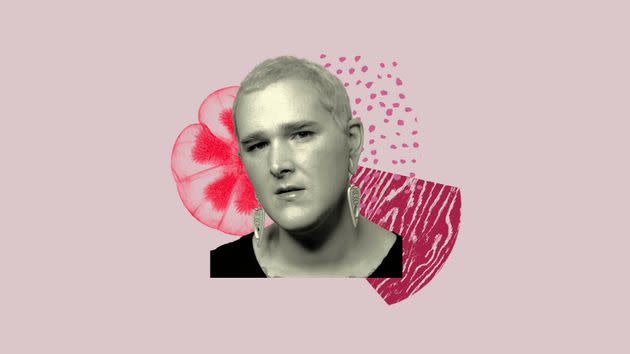Telly Justice: 'There Is No Space For Identity' For Queer Chefs In Most Kitchens

(Photo: Robert Bredvad)
“HAGS is a restaurant by queer people, for queer people and everyone else,” said 35-year-old chef Telly Justice about the queer-potluck-inspired eatery that she recently opened alongside romantic and business partner Camille Lindsley earlier this year. To put it simply, the duo hopes to highlight the issues that plague the LGBTQ+ community in the culinary world while trying to simultaneously offer solutions to them — all the while catering to other communities.
In this Voices in Food story, Justice tells Anna Rahmanan about the inherent problems with kitchen uniforms, the importance of non-gendered bathrooms and more.
On Working In ‘Non-Affirming’ Uniforms
I think one of the biggest standout issues that we face in the dining community is that it is a very utilitarian, blue-collar, working industry. People are expected to wear these uniforms that are created in certain shapes and sizes that are not necessarily reflective of how queer people like to feel in clothes or like to look in clothes. From a very practical standpoint, we’re talking about the classic chef outfit and the other very masculine uniforms. They have a tendency to create an almost non-gendered experience, but in a non-affirming way.
At HAGS, we are looking to find ways to allow folks that are working in uniforms to customize them in ways that make them feel affirmed and like their identity and personality are welcome in the space.
Standard industrial kitchens and dining rooms are hyper-masculine spaces. There is no space for identity there — especially a non-hetero or masculine identity. Safety isn’t discussed with any seriousness, and safety is typically not very well protected.
From a very practical standpoint, we’re talking about the classic chef outfit and the other very masculine uniforms. They have a tendency to create an almost non-gendered experience, but in a non-affirming way.Telly Justice
In industrial kitchens, there is a feeling that queer people sort of have to be pioneers of the spaces. We have to fight for equitable work practices. We are the ones who have to speak the loudest about making sure that, for instance, pronoun usage is handled sensitively and taken seriously. There is no end to the amount of emotional labor that comes hand in hand with being queer in these spaces.
I think that small businesses, especially these progressive small businesses that have created space for intersectionality and identity, are often left to fend for themselves and fight to find some kind of path toward financial solvency. There is the classic conservative catchphrase, “Go woke, go broke,” and it’s not entirely untrue. It’s very difficult to find the financial support to include as much space for workers and laborers, but we really should.
On Policy Changes And Inclusivity
There are things that I would love to see in terms of protecting folks’ use of pronouns, which feels like a very speculative gray area in policy right now. I don’t know if the continual misuse of personal pronouns is specifically considered in the place of workplace harassment.
Having some sort of pathway in policy to get all public bathrooms to a state of gender neutrality or at least focused on gender expansiveness is also necessary. I think non-gendered bathrooms in dining rooms are becoming more of a prominent feature, but we want to make sure that they are actually practical and that the spaces are equally usable for all genders, including gender-expansive individuals.
In New York, one of the things that was eye-opening to me while developing HAGS is that we worked so hard to get the space up to the standards of the Americans with Disabilities Act, and it was very expensive. So I think it would be lovely if the government enacted some sort of policy or at least a beneficial system for folks that open abiding guidelines rather than just penalizing those who don’t. After all, if you’re queer and in a wheelchair and you can’t enjoy HAGS in the same way that an individual that is not in a wheelchair can, then we’re not really super inclusive of all queer people.
This article originally appeared on HuffPost and has been updated.

